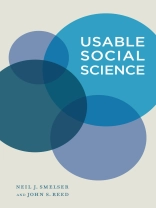This volume is a one-of-a-kind contribution to applied social science and the product of a long collaboration between an established, interdisciplinary sociologist and a successful banking executive. Together, Neil Smelser and John Reed use a straightforward approach to presenting substantive social science knowledge and indicate its relevance and applicability to decision-making, problem-solving and policy-making. Among the areas presented are space-and-time coordinates of social life; cognition and bias; group and network effects; the role of sanctions; organizational dynamics; and macro-changes associated with economic development. Finally, the authors look at the big picture of why society at large demands and needs social-science knowledge, and how the academy actually supplies relevant knowledge.
قائمة المحتويات
Preface
Introduction: The Problem and Our Take on It
Part I. Arenas of Usability
1. Space and Time: Constraints and Opportunities
2. Some Dynamics of Cognition, Judgment, and Bias
3. Sanctions in Organizational and Social Life
4. Groups, Teams, Networks, Trust, and Social Capital
5. How Decisions Are Made
6. Organizations and Organizational Change
7. Economic Development and Social Change
8. Methods of Research and Their Usability
Part II. The Big Picture of Usability
9. Social Change, Social Problems, and Demands for Knowledge
10. The Production of Knowledge in the Social Sciences
References
Index
عن المؤلف
Neil J. Smelser is a senior scholar and University Professor at the University of California and author of several UC Press books, most recently The Odyssey Experience and Reflections on the University of California. John Reed is currently Chairman of the Corporation of MIT and former Chairman of the New York Stock Exchange and former Chairman and CEO of Citicorp, Citibank and Citigroup.












